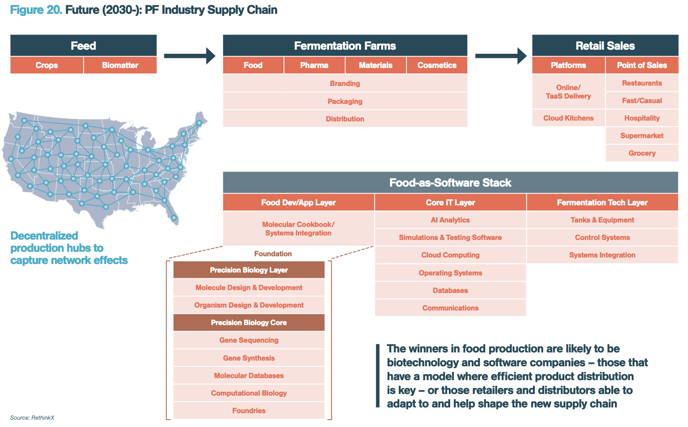Emerging technologies present a distributed, open source, low-cost food system. However, choices made by policymakers, investors, businesses and consumers determine whether our societies can harness their full potential.
Emerging technologies have the potential to create a distributed, open-source, low-cost food system in which entrepreneurs anywhere will be able to design and produce foods with relatively low barriers to entry. However, a disruption that realizes all the potential benefits is not a foregone conclusion.
The key agents of change in this disruption are policymakers, investors, businesses and consumers. The choices these groups make influence each other and affect the speed of adoption of modern food technologies and the disruption of industrial agriculture. The choices made will determine whether society can seize the full potential of the benefits of this disruption and avoid negative outcomes.
Some key suggestions to avoid these negative outcomes include:
-
Allow companies to patent production methods but not life, genes or molecules-IP regimes should be process focused rather than output focused. This will encourage innovators to develop open-source platforms and molecular, cellular and biological system databases.
-
Avoid following the pharmaceutical model when implementing intellectual property regimes because, unlike drug development, the cost of product development via modern food production is already relatively low and falling fast.
-
Support the creation of open-source, transparent, collaborative networks-preferably international–to accelerate the pace of development.
-
Enable well-regulated markets but do not participate in or distort the food or agriculture business. For instance, today the United States government stockpiles 1.4 billion pounds of cheese that it pushes in the form of school lunches and the Supplemental Nutrition Assistance Program.
Explore the evidence...
- The economics of modern food technologies are such that the modern food disruption will play out regardless of the actions taken by decision-makers in any single country. Decision-makers do, however, have the power to speed up or slow down the adoption of these new technologies. The key agents of change in this disruption are policymakers, investors, businesses and consumers. The choices these groups make influence each other and affect the speed of adoption of modern food technologies and the disruption of industrial agriculture. The choices made will determine whether society can seize the full potential benefits of this disruption. Read more about the choices and planning for these agents of change on p59-63 of our Rethinking Food & Agriculture report.
- Ultimately, decisions made regarding intellectual property rights and approval processes will determine which system develops where. Learn more about the opportunities and choices available for decision makers in the new supply chain on p45-47 of our Rethinking Food & Agriculture report.
- The future of Food-as-Software (FaaS) technology represents an opportunity for a food system that is distributed, efficient and superabundant. Food-as-Software describes a process whereby where individual molecules engineered by scientists are uploaded to databases. These databases then become molecular cookbooks that food engineers anywhere in the world can use to design products in the same way that software developers design apps. This model ensures constant iteration so that products improve rapidly, with each version superior and cheaper than the last. It also ensures a production system that is completely decentralized and much more stable and resilient than industrial animal agriculture. Learn more about Food-as-Software in our blog post.
- The image below shows how the precision fermentation industry supply chain will encourage distributed and decentralized hubs to capture network effects, from p45 of our Rethinking Food & Agriculture report.

- Decentralization of the industry will bring food production to cities, increasing their autonomy and improving resiliency. Equally, more remote communities will no longer be wholly reliant on importing food but could provide for themselves more easily and reliably. Learn more about the impacts of the modern food disruption, and its effect on sectors across our societies on p40-57 of our Rethinking Food & Agriculture report.
Witness the transformation
The disruption of food and agriculture is inevitable–modern products will be cheaper and superior in every conceivable way–but policymakers, investors, businesses and civil society as a whole have the power to slow down or speed up their adoption.
To unlock the full potential of this and every other technological disruption, we need to embrace a different approach, one that better reflects the complex, dynamic and rapidly changing world we live in. Policymakers must, therefore, start planning for the modern food disruption now in order to capture the extraordinary economic, social and environmental benefits it has to offer, and to ensure the disruption is decentralized and accessible to all.
Learn more about the disruption of food & agriculture.
Published on: 12/07/23
